
Beginning March 5, 2024, VA made all Veterans who meet the basic service and discharge requirements and were exposed to toxins while serving our country eligible to enroll directly in VA health care without first applying for VA benefits. We’re using every tool at VA’s disposal to ensure that as many of these Veterans as possible come to VA for their care.
This expansion of care means that all Veterans who served in the Vietnam War, the Gulf War, Iraq, Afghanistan, the Global War on Terror or any other combat zone after 9/11 will be eligible to enroll directly in VA health care without first applying for VA benefits. Additionally, Veterans who never deployed but were exposed to toxins or hazards while training or on active duty in the United States will also be eligible to enroll.
VA has prepared this PACT Act Stakeholder Toolkit for you to use and share information about VA’s expansion of health care eligibility for Veterans. The Toolkit offers multiple communications resources you can use to reach your community members and help them better understand expanded care under PACT Act.
We value your support and thank you for sharing vital VA health information with your constituents to assist Veterans, their families and survivors in receiving the care they deserve. If a Veteran community member asks you about the PACT Act, please direct them to www.va.gov/PACT or call 1-800-MyVA411.
Key messages
- Beginning March 5, VA made millions of Veterans eligible for VA health care years earlier than called for by the PACT Act.
- Specifically, all Veterans who meet the basic service and discharge requirements and were exposed to toxins and other hazards while serving our country—at home or abroad—are eligible to enroll directly in VA health care without first applying for VA benefits.
- That includes all Veterans who served in the Vietnam War, the Gulf War, Iraq, Afghanistan, or any other combat zone after 9/11.
- It includes all Veterans who deployed in support of the Global War on Terror.
- And it includes Veterans who never deployed but were exposed to toxins or hazards while training or on active duty here at home, including those who worked with chemicals, pesticides, lead, asbestos, certain paints, nuclear weapons, x-rays and more.
- To be eligible to enroll in VA health care, Veterans must meet the minimum active-duty service requirements, have a qualifying discharge, and meet one or more eligibility requirements specific to VA health care. VA encourages all Veterans to apply to determine their enrollment eligibility.
- We’re doing this because VA care is proven to be the best, most affordable health care in America for Veterans and we want as many Veterans as possible to come to us for their care.
- So, to all the Veterans out there: don’t wait, apply for the care you deserve at VA.gov/PACT.
- Even if you don’t need this care today, you might need it tomorrow, or the next day, or 30 years from now. It’s quick and easy to apply. And once you’re in, you have access for life.
Sample social media
These sample posts can be used for spreading awareness about this health care expansion. We encourage you to create your own social media as well. You can also attach relevant videos, graphics and collateral (included in this document) to any of these posts, as needed.
Repost/share
Social Media Post Options
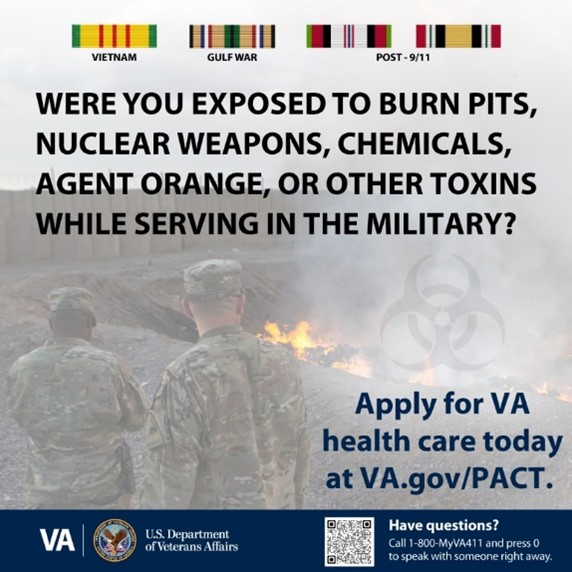
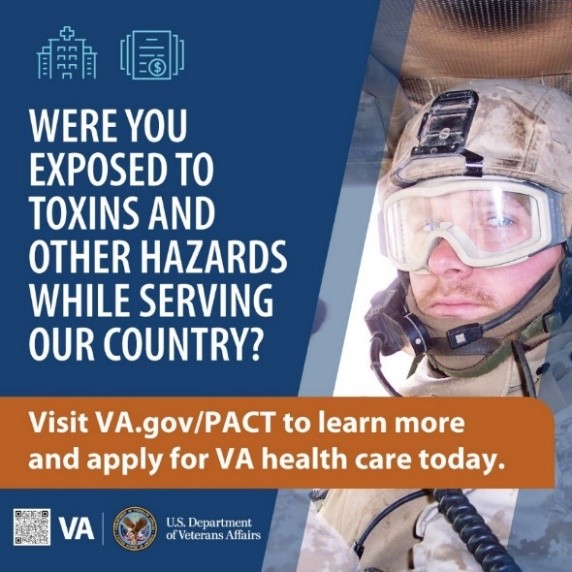
General Eligibility
Option 1 (toxic exposures): Do you believe you were exposed to burn pits, Agent Orange, chemicals, nuclear weapons or other toxins while serving in the military? If so, you may be eligible for the best, most affordable health care in America for Veterans, even if you never deployed. Don’t wait—apply today at VA.gov/PACT.
Option 2 (by war): Did you serve in Iraq, Afghanistan or any other combat zone after 9/11? If so, you’re now eligible for the best, most affordable health care in America for Veterans. Don’t wait—apply today at VA.gov/PACT.
Option 3 (TERA): Were you ever exposed to burn pits, Agent Orange, chemicals, nuclear weapons or other toxins while serving in the military? Even if you never deployed, you may be eligible for VA health care. Don’t wait—apply today at VA.gov/PACT.
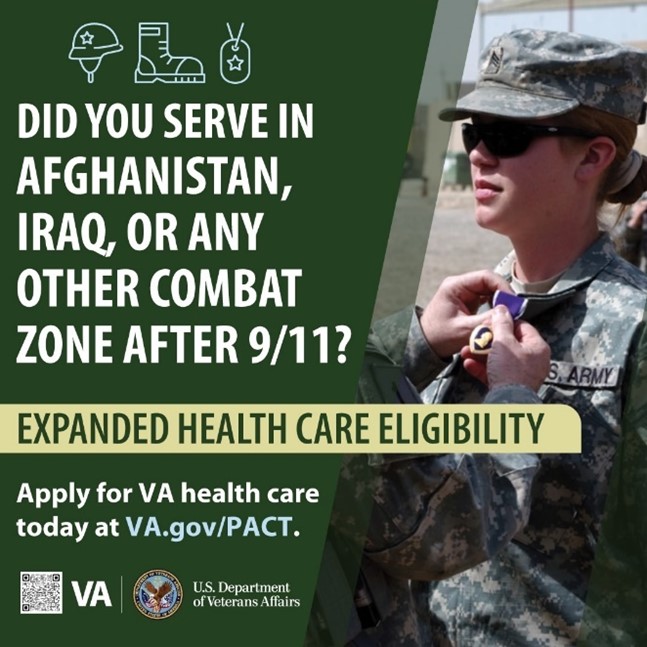
Eligibility by War
Iraq/Afghanistan Option: Did you serve our country in Iraq or Afghanistan? You’re now eligible for the best, most affordable health care in America for Veterans. Apply now at VA.gov/PACT.
Global War on Terror Option: Did you deploy in support of the Global War on Terror? If so, you’re now eligible for the best, most affordable health care in America for Veterans. Don’t wait—apply today at VA.gov/PACT.
General Option: Did you deploy to a combat zone after 9/11? If you’ve never signed up for VA health care, you should apply TODAY. Don’t wait—apply today at VA.gov/PACT.
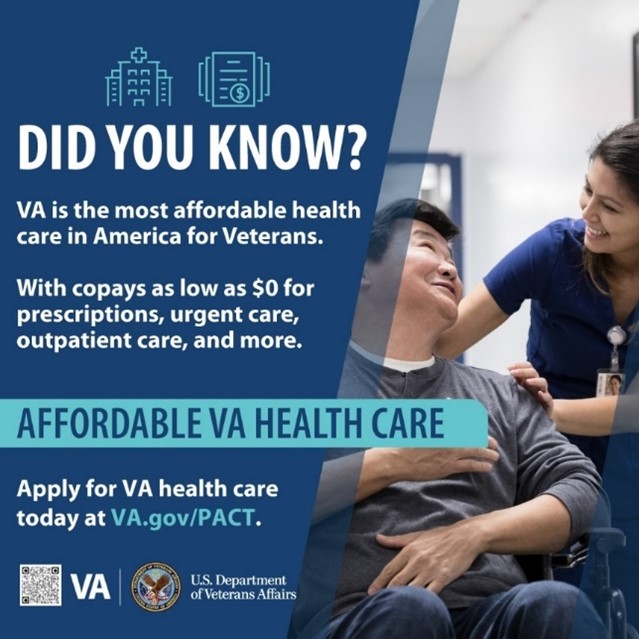
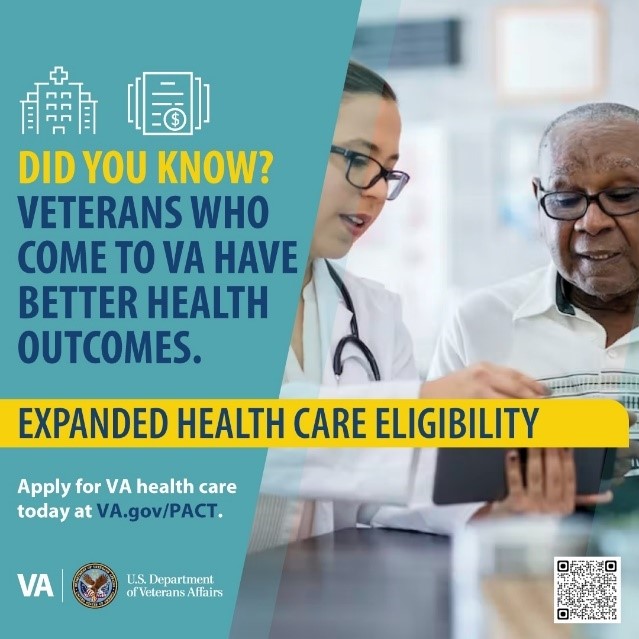
Why Apply for VA Care
Veteran Quality Option: VA is proven to be the best, most affordable care in the country for Veterans. Our clinicians know how to treat Veterans—and are often are Veterans themselves—which is why Veterans who come to VA do better. Learn more at VA.gov/PACT.
Studies Option: Recent studies have shown that Veterans who come to VA have better health outcomes than those who go to the private sector. Our clinicians treat Vets every day—and are often Veterans themselves—which is why Veterans who come to VA do better. Learn more at VA.gov/PACT.
Affordability Option: Veterans who get their health care from VA are proven to have better health outcomes—and save money. Millions of Veterans just became eligible for this affordable care from VA. Learn more at VA.gov/PACT. What You Earned: Save money on health care with VA – YouTube
Easy to Apply Option: Millions of Veterans who were exposed to toxins or other hazards while serving are now eligible for VA health care. It only takes a few minutes to apply, and if you enroll, you have access for life. Don’t wait—apply today at VA.gov/PACT. You may be able to enroll directly in VA care today. Learn more and apply now: https://www.va.gov/health-care/apply/application/introduction.
Collateral and Resources
- VA.gov/PACT: the best place for Veterans and their families to learn about all things PACT Act and apply today.
- VA’s Health Care Application Website
- VA Health Care Eligibility Website
- Video: How VA health care and benefits can help you save
- Video: Save money on health care with VA (30 seconds)
- Video: Save money on health care with VA (15 seconds)
- Downloadable General PACT Act PSA 1
- Downloadable General PACT Act PSA 2
- Blog: How to Spread the Word about the PACT Act (includes nearly 20 fact sheets in 10+ languages)
- Accessing PACT Act Benefits and Services Journey Map
Sample Email to Your Communities
[Subject]VA expands health care eligibility for all Veterans exposed to toxins and other hazards during military service
[Body]As you may have heard, VA announced that all Veterans who meet the basic service and discharge requirement and were exposed to toxins and other hazards while serving our country at home or abroad—including all Veterans who served in the Vietnam War, Gulf War, Iraq, Afghanistan or any other combat zone after 9/11—are now eligible to enroll directly in VA health care without first applying for VA benefits. Additionally, Veterans who never deployed but were exposed to toxins or hazards while training or on active duty in the United States are also eligible to enroll.
This historic expansion of health care comes after VA eliminated the phased-in approach to health care eligibility called for by the PACT Act, meaning that millions of Veterans are becoming eligible for VA health care up to eight years earlier than written into law.
I encourage Veterans to act now and get the care you, your families or your survivors deserve. VA provides the best and most affordable health care for Veterans in America, and this is your chance to apply. Please visit VA.gov/PACT or call 1-800-MYVA411 to find information on how to apply for VA health care.
I look forward to continuing my work on behalf of Veterans and their families and honoring the sacrifices they have made to serve and protect our country.
Sample Speech
Beginning March 5, 2024, VA made three new groups of Veterans eligible for VA health care years earlier than called for by the PACT Act:
- Veterans who were exposed to toxins or other hazards during military service;
- Veterans who were assigned to certain duty stations in Southwest Asia or parts of Africa; and
- Veterans who deployed in support of certain operations after 9/11.
Here’s what that means for Veterans:
If you served in Vietnam, the Gulf War, Iraq, or Afghanistan, you can enroll.
If you deployed to any combat zone after 9/11, you can enroll.
If you deployed in support of the Global War on Terror, you can enroll.
And even if you never deployed but were exposed to toxins or hazards while training or serving on active duty here at home – by working with chemicals, pesticides, lead, asbestos, certain paints, nuclear weapons, x-rays, and more – you can enroll, too.
Bottom line: all Veterans who meet the basic service and discharge requirements and were exposed to toxins and other hazards – at home or abroad – are now eligible to enroll in VA care.
This is the biggest expansion of care in generations, and VA wants you to apply as soon as possible.
It’s quick and easy to enroll. You don’t need to be sick or file a claim to become eligible; all you have to do is show that you served in one of those locations or operations – or participated in one of the activities that could have exposed you to toxins or hazards. VA health care is proven to be the best, most affordable care in America for Veterans – and Veterans who come to VA have better health outcomes.
Even if you don’t think you need this care today, you might need it tomorrow, or the next day, or 30 years from now. All you have to do is enroll, then you have access for life.
So don’t miss this opportunity: better, more affordable health care is waiting for you. Go to VA.gov/PACT and get it.
Frequently Asked Questions
What changed with this expansion of care?
Under the PACT Act, all toxic exposed Veterans were supposed to become eligible for VA care—in increments—between now and 2032.
But as President Biden directed in his 2023 Veterans Day speech, VA eliminated the phased-in approach, meaning millions of Veterans are now eligible for VA care more quickly.
This means that Veterans who meet the basic service and discharge requirements and were exposed to toxins and other hazards while serving our country—at home or abroad—are now eligible for VA care.
That includes:
Veterans who performed active service while assigned to a duty station in (including airspace above) certain locations during specific periods of time;
On or after Aug. 2, 1990, in the following countries: Bahrain, Iraq, Kuwait, Oman, Qatar, Saudi Arabia, Somalia, or the United Arab Emirates;
On or after Sept. 11, 2001, in the following countries: Afghanistan, Djibouti, Egypt, Jordan, Lebanon, Syria, Yemen, Uzbekistan or any other country determined relevant by VA (NOTE: VA has not determined any other country relevant at this time);
Veterans who participated in a Toxic Exposure Risk Activity (TERA), as defined by law (and described below), while serving on active duty, active duty for training or inactive duty training;
Veterans who deployed in support of Operation Enduring Freedom, Operation Freedom’s Sentinel, Operation Iraqi Freedom, Operation New Dawn, Operation Inherent Resolve or Resolute Support Mission.
Will this expansion of care expire?
No, Veterans can apply at any time. This expansion of care is here to stay—no deadlines, no expiration dates. However, we encourage Veterans to apply today so they have access to care when they need it.
How does this make the health care enrollment process easier for Veterans?
Many Veterans believe they have to file a claim for disability compensation benefits and get their claim approved to get access to VA health care.
But with this expansion and other authorities, that isn’t accurate.
If you served in World War II, Vietnam, the Gulf War, Iraq or Afghanistan, you’re eligible.
If you deployed to any combat zone after 9/11, you’re eligible.
If you deployed in support of the Global War on Terror, you’re eligible.
And even if you never deployed but were exposed to toxins or hazards here at home—by working with chemicals, pesticides, lead, asbestos, certain paints, nuclear weapons, x-rays and more—you’re eligible, too.
Even if none of these descriptions match your service, you may be eligible based on your income.
Bottom line: it’s now quicker and easier than ever for you to enroll.
You don’t need to be sick or file a claim to become eligible; all you have to do is show that you served in one of those locations or operations, or participated in one of the activities that could have exposed you to hazards.
So don’t worry and don’t wait, apply on March 5 to get access to the best, most affordable health care in America for Veterans.
Why should a Veteran apply for VA care?
VA provides the best and most affordable health care for Veterans in America, and this is your chance to apply.
Veterans who are enrolled in VA health care are proven to have better health outcomes than those who get their care elsewhere. And this year alone, VA has beaten non-VA hospitals in quality ratings and patient satisfaction ratings.
That’s because our clinicians know Veterans—and are often Veterans themselves—and they know exactly how to help.
VA health care isn’t only the best option for Veterans, it’s often the most affordable, with copays as low as $0 for prescriptions, urgent care, outpatient care, and more for some Veterans at VA.
So don’t wait! Get the world class care you’ve earned. Apply today at VA.gov/PACT.
What’s considered a toxic exposure risk activity?
A TERA includes any activity that requires a corresponding entry in the Individual Longitudinal Exposure Record (ILER) or another exposure tracking record system.
Additionally, VA has determined that Veterans who were exposed to one or more of the following hazards or conditions during active duty, active duty for training or inactive duty training participated in a TERA, regardless of their geographic location:
Air pollutants (burn pits, sand, dust, particulates, oil well fires, sulfur fires);
Chemicals (pesticides, herbicides, depleted uranium with embedded shrapnel, contaminated water);
Occupational hazards (asbestos, industrial solvents, lead, paints including chemical agent resistant coating, firefighting foams);
Radiation (nuclear weapons handling, maintenance and detonation, radioactive material, calibration and measurement sources, X-rays, radiation from military occupational exposure);
Warfare agents (nerve agents, chemical and biological weapons).
This is not a comprehensive list, and there’s no deadline to apply. Veterans can view additional military exposure categories on VA’s Public Health website at https://www.publichealth.va.gov/exposures/.
How does this impact Veteran copayments?
All VA health care is low- or no-cost for Veterans, but with this expansion of care, we are dramatically expanding the amount of care that we will deliver for free.
Specifically, Veterans who enroll under this expanded health care eligibility do not owe copayments for treatment for any condition that may be related to their qualifying service (service in a covered location and period, service in support of a contingency operation, or their participation in an activity that may have exposure them to toxins or other hazards).
Additionally, VA is also proactively reviewing the Priority Groups of Veterans who are already enrolled in VA care to see if they qualify based on their service in a covered location or in support of a contingency operation for a higher Group, which would make them eligible for these reduced copayments.
While we are working urgently to implement these copayment changes, it is a work in progress.
If you believe you are wrongly charged copayments for treatment that may be related to your service, please let us know.
We work with you, and if we verify that it was an erroneous copayment, VA will provide you a refund.
Must Veterans have participated in a TERA during a specific time period?
No. To qualify, a Veteran could have participated in a TERA at any time while serving on active duty, active duty for training or inactive duty training.
How will VA determine if a Veteran participated in a TERA and is eligible for health care?
VA will use all available information and records to ensure every Veteran receives the health care they have earned and deserve. VA enrollment and eligibility staff will follow the outlined process below when reviewing new applications for enrollment.
Review the Veteran’s military records to determine if they qualify based on service dates and locations or any other existing authority.
If not, VA will then determine if Veterans participated in a Toxic Exposure Risk Activity (TERA):
If a Veteran is not eligible to enroll on any other basis, VA will consider required entries in the Veteran’s Individual Longitudinal Exposure Record (ILER) and other Veteran records to determine if the Veteran participated in a TERA during military service. If a Veteran disagrees with an enrollment decision, they can submit evidence of participation in a TERA to appeal the decision.
Must Veterans meet the minimum active-duty service eligibility requirements when applying for VA health care under PACT Act authorities?
- Yes. To be eligible to enroll in VA health care, Veterans must meet the minimum active-duty service requirements, have a qualifying discharge, and meet one or more eligibility requirements specific to VA health care.
- VA encourages all Veterans to apply for VA health care to determine their eligibility.
What are the minimum active-duty service requirements for VA health care?
- In general, Veterans must have served 24 months of continuous active duty or the full period for which they were called or ordered to active duty.
- Former members of the Reserves or National Guard are eligible for VA health care if they have qualifying service (as described above) and meet one of the health care eligibility requirements in the PACT Act. Former members of the Reserves or National Guard who only served for training purposes may not be able to establish Veteran status if they did not incur a qualifying disability during such training.
- Some exceptions apply. Please visit www.va.gov/health-care/eligibility for more information.
What are the exceptions to the minimum active-duty service requirements for VA health care?
- The minimum active-duty service requirement for VA health care may not apply if any of these are true:
- The Veteran was discharged or released for a qualifying reason (e.g., early discharge, hardship, medical discharge).
- The Veteran was discharged for a disability that was caused—or made worse—by active-duty service.
- The Veteran served prior to the early 1980s.
- VA encourages all Veterans to apply to determine their enrollment eligibility. Please visit www.va.gov/health-care/eligibility for more information.
What is ILER?
The Individual Longitudinal Exposure Record (ILER) is an individual, electronic record of exposures designed in collaboration between the Department of Defense (DoD) and VA for each service member and Veteran.
What happens to my current health care if I sign up for VA?
Many Veterans who get their care from VA also have other forms of health insurance. Unless you lose assistance under the Affordable Care Act (ACA), signing up for VA will not impact your ability to continue seeing your current providers using your current insurance if you’d like.
Enrolling in VA health care could impact your eligibility for premium tax credits under the ACA. To learn more, visit https://www.va.gov/health-care/about-va-health-benefits/va-health-care-and-other-insurance/.
What do I get when I enroll in VA health care?
VA offers world class, comprehensive health care—including yearly physicals, health assessments, free screenings (including a toxic exposure screening), specialized care for issues related to military service and more. This is true regardless of whether or not you have a service-connected condition.
VA health care can serve as your sole source of health care, or as a complement to other plans, and the care is portable, so the coverage follows you if they travel or relocate.
What is VA doing to spread the word to these Veterans?
VA will stop at nothing to ensure that as many Veterans as possible enroll.
To date, VA’s PACT Act outreach campaign has included more than 2,500 events nationwide, $13 million in paid media, 88,000 earned media clips, more than 400 million emails and letters to Veterans, the creation of a one-stop-shop PACT Act website and more.
This is the largest outreach campaign in VA history, and we won’t rest until every Veteran—and every survivor—gets the health care and benefits they deserve under the PACT Act.
Can Veterans still apply for benefits under the PACT Act?
Yes. The PACT Act is the largest expansion of VA benefits in generations, and Veterans and survivors can apply anytime for the PACT Act benefits they deserve.
Since the PACT Act was signed into law, VA has delivered billions in PACT Act benefits to Veterans and their survivors nationwide—and that’s just the beginning.
Visit VA.gov/PACT to learn more and apply today.
How the PACT Act is helping Veterans
The PACT Act has expanded VA health care and benefits for millions of Veterans and their survivors.
Since President Biden signed the PACT Act into law on Aug. 10, 2022, VA has delivered billions in PACT Act-related benefits to Veterans. Additionally:
More than 1 million Veterans have applied for PACT Act-related benefits;
More than 5 million enrolled Veterans have received the new toxic exposure screenings; and
More than 500,000 Veterans have enrolled in VA health care.
We at VA want all eligible Veterans and survivors to get the care and benefits they’ve earned. So don’t wait, visit VA.gov/PACT.
Topics in this story
More Stories
Veteran Joy Smith survived breast cancer twice. Here’s her story of vulnerability, bravery and relentless spirit.
Columbia VA’s pain program addresses not only the physical aspects but also the emotional and psychological factors.
Disclaimer: The sharing of any non-VA information does not constitute […]







What about those who served in Honduras with burnpits or those who had to reenlist to receive bonuses while being a contractor in Afghanistan?
Having tried numerous times over the years to have a diagnosis for different skin problems and intestinal problems, I still have not been able to get the help I need. The last time I was even able to get a checkup was in 2019. Before that was 12 years separated. The outreach programs don’t reach us living in Japan. Not even with the FMP.
What about operation hard hat
I am a SW in the transitioning space and Enrollment and Eligibility nuances create the largest barrier to accessing care. I have talked with my local E&E team about this new expansion and they understand it completely different than what is written in this article. What kind of education is being provided to VHA employees to ensure that they know who is eligible?
I don’t want the VA health care, but I want compensation for serving in Thailand.
Have some VA coverage but don’t feel that they have the complete story of my different exposures. Both at camp Geiger and as a dod employee in Iraq
Does a veteran have to meet the 24 continuous months of active duty for enrollment under the Pact Act if he was exposed to toxins during active duty training or active duty for basic training?
What about exposure to aqueous film forming foam (AFFF)? Back when I was in the Navy (1976-80), onboard our ship, we were using AFFF to remove rust. We used AFFF right out of the 5-gallon blue buckets, poured it into cans, then applied with paint brushes. What did we know, we were young deck seamen.
1985-1986 IRON Brigade
Hurt 2
1986-1988 Fort Benning, 197th Inf
Hurt from Germany ??
1988-1991 The Rock
1990-1991 Desert Shield and Desert Storm
Hurt 2 teeth bad
100′ VA 1998
Try a Purple Heart 4 times.
Really
Purnell
Spearhead